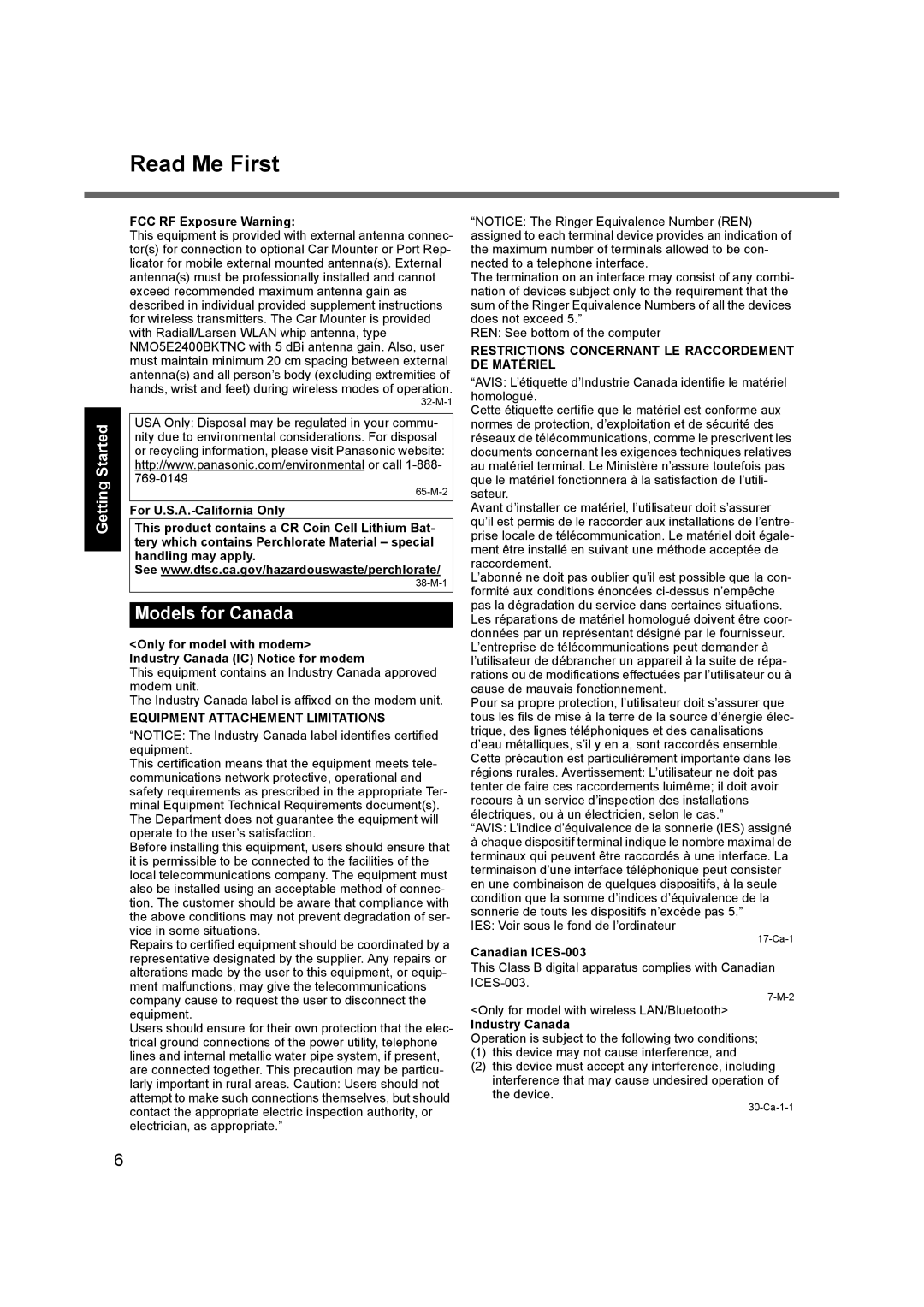
Read Me First
Appendix Troubleshooting Useful Information Getting Started
FCC RF Exposure Warning:
This equipment is provided with external antenna connec- tor(s) for connection to optional Car Mounter or Port Rep- licator for mobile external mounted antenna(s). External antenna(s) must be professionally installed and cannot exceed recommended maximum antenna gain as described in individual provided supplement instructions for wireless transmitters. The Car Mounter is provided with Radiall/Larsen WLAN whip antenna, type NMO5E2400BKTNC with 5 dBi antenna gain. Also, user must maintain minimum 20 cm spacing between external antenna(s) and all person’s body (excluding extremities of hands, wrist and feet) during wireless modes of operation.
USA Only: Disposal may be regulated in your commu- nity due to environmental considerations. For disposal or recycling information, please visit Panasonic website: http://www.panasonic.com/environmental or call
For
This product contains a CR Coin Cell Lithium Bat- tery which contains Perchlorate Material – special handling may apply.
See www.dtsc.ca.gov/hazardouswaste/perchlorate/
Models for Canada
<Only for model with modem> Industry Canada (IC) Notice for modem
This equipment contains an Industry Canada approved modem unit.
The Industry Canada label is affixed on the modem unit.
EQUIPMENT ATTACHEMENT LIMITATIONS
“NOTICE: The Industry Canada label identifies certified equipment.
This certification means that the equipment meets tele- communications network protective, operational and safety requirements as prescribed in the appropriate Ter- minal Equipment Technical Requirements document(s). The Department does not guarantee the equipment will operate to the user’s satisfaction.
Before installing this equipment, users should ensure that it is permissible to be connected to the facilities of the local telecommunications company. The equipment must also be installed using an acceptable method of connec- tion. The customer should be aware that compliance with the above conditions may not prevent degradation of ser- vice in some situations.
Repairs to certified equipment should be coordinated by a representative designated by the supplier. Any repairs or alterations made by the user to this equipment, or equip- ment malfunctions, may give the telecommunications company cause to request the user to disconnect the equipment.
Users should ensure for their own protection that the elec- trical ground connections of the power utility, telephone lines and internal metallic water pipe system, if present, are connected together. This precaution may be particu- larly important in rural areas. Caution: Users should not attempt to make such connections themselves, but should contact the appropriate electric inspection authority, or electrician, as appropriate.”
“NOTICE: The Ringer Equivalence Number (REN) assigned to each terminal device provides an indication of the maximum number of terminals allowed to be con- nected to a telephone interface.
The termination on an interface may consist of any combi- nation of devices subject only to the requirement that the sum of the Ringer Equivalence Numbers of all the devices does not exceed 5.”
REN: See bottom of the computer
RESTRICTIONS CONCERNANT LE RACCORDEMENT DE MATÉRIEL
“AVIS: L’étiquette d’Industrie Canada identifie le matériel homologué.
Cette étiquette certifie que le matériel est conforme aux normes de protection, d’exploitation et de sécurité des réseaux de télécommunications, comme le prescrivent les documents concernant les exigences techniques relatives au matériel terminal. Le Ministère n’assure toutefois pas que le matériel fonctionnera à la satisfaction de l’utili- sateur.
Avant d’installer ce matériel, l’utilisateur doit s’assurer qu’il est permis de le raccorder aux installations de l’entre- prise locale de télécommunication. Le matériel doit égale- ment être installé en suivant une méthode acceptée de raccordement.
L’abonné ne doit pas oublier qu’il est possible que la con- formité aux conditions énoncées
Pour sa propre protection, l’utilisateur doit s’assurer que tous les fils de mise à la terre de la source d’énergie élec- trique, des lignes téléphoniques et des canalisations d’eau métalliques, s’il y en a, sont raccordés ensemble. Cette précaution est particulièrement importante dans les régions rurales. Avertissement: L’utilisateur ne doit pas tenter de faire ces raccordements luimême; il doit avoir recours à un service d’inspection des installations électriques, ou à un électricien, selon le cas.”
“AVIS: L’indice d’équivalence de la sonnerie (IES) assigné
àchaque dispositif terminal indique le nombre maximal de terminaux qui peuvent être raccordés à une interface. La terminaison d’une interface téléphonique peut consister en une combinaison de quelques dispositifs, à la seule condition que la somme d’indices d’équivalence de la sonnerie de touts les dispositifs n’excède pas 5.”
IES: Voir sous le fond de l’ordinateur
Canadian ICES-003
This Class B digital apparatus complies with Canadian
<Only for model with wireless LAN/Bluetooth>
Industry Canada
Operation is subject to the following two conditions;
(1)this device may not cause interference, and
(2)this device must accept any interference, including interference that may cause undesired operation of the device.
6
